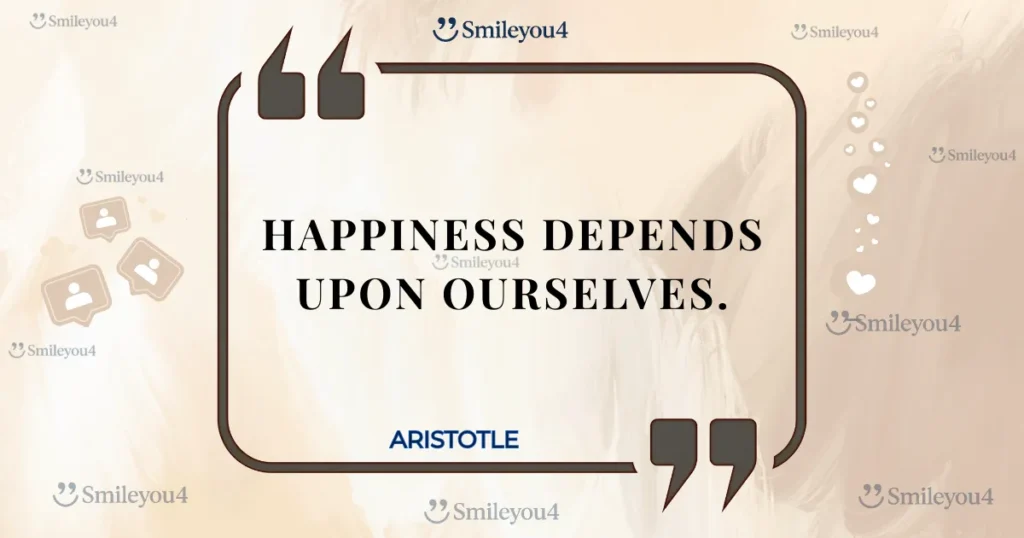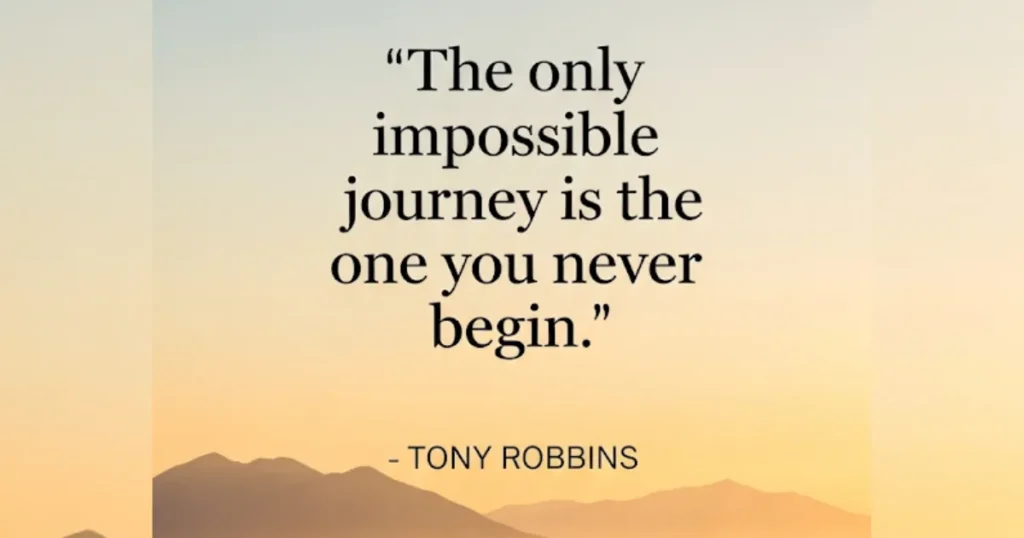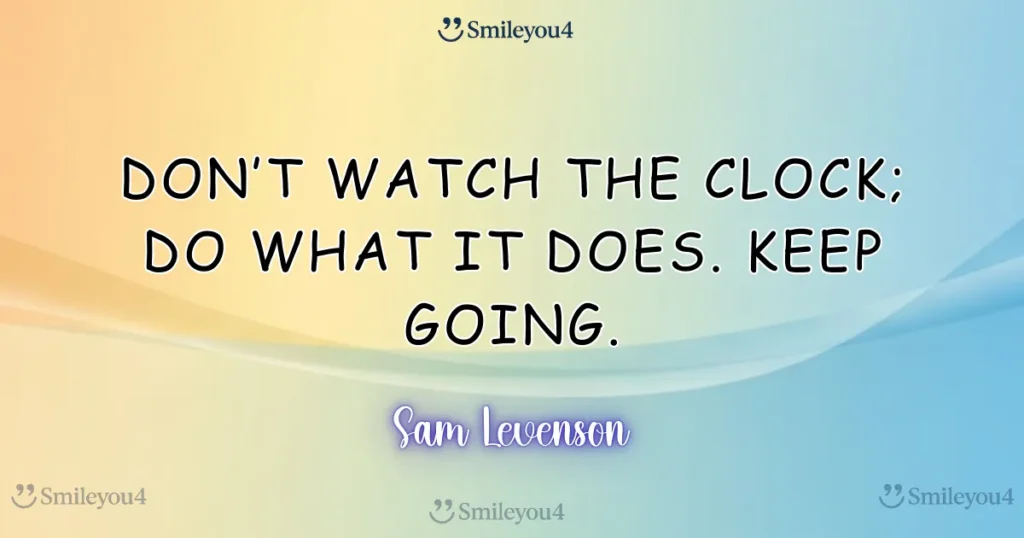What if the secret to lasting happiness has been hiding in plain sight for over 2,000 years? Aristotle, one of history’s greatest philosophers, understood something profound that most people still struggle to grasp today: “Happiness depends upon ourselves.” This happiness depends upon ourselves Aristotle wisdom isn’t just ancient philosophy—it’s a revolutionary mindset that can transform how you approach every single day.

You’ve probably spent years searching for happiness in external places: the perfect job, ideal relationship, dream vacation, or next big purchase. Yet here’s what Aristotle discovered through careful observation of human nature: true joy comes from within, and you have far more control over your happiness than you realize.
Today, we’ll explore how this timeless truth can become your daily reality. You’ll discover why Aristotle happiness depends upon ourselves remains one of the most empowering principles ever articulated and learn practical steps to take full ownership of your joy starting right now.
Understanding Aristotle’s Revolutionary Approach to Happiness
The Philosopher Who Studied Human Flourishing
When Aristotle declared that happiness depends upon ourselves, he wasn’t offering empty motivation. As a student of human nature and behavior, he spent decades studying what actually makes people thrive. His research led him to a groundbreaking conclusion: external circumstances have far less impact on our well-being than our internal responses and choices.
The Aristotle approach to happiness was revolutionary because it shifted power from external forces to personal agency. Instead of viewing joy as something that happens to you, he understood it as something you actively create through your thoughts, actions, and daily habits.
His philosophy teaches us that waiting for perfect conditions to be happy is like waiting for a bus that never comes. True contentment emerges when you realize that happiness depends upon ourselves—and you start taking deliberate action to cultivate it.
Breaking Down the Quote’s Life-Changing Message
“Happiness depends upon ourselves.” Let’s examine why these five simple words contain the key to transforming your entire approach to joy:
- “Happiness” represents not just momentary pleasure, but deep, lasting contentment and fulfillment
- “Depends upon” suggests a cause-and-effect relationship that you can influence
- “Ourselves” places the power squarely in your hands, not in external circumstances
This happiness depends upon ourselves Aristotle philosophy works because it eliminates victimhood thinking. Instead of believing you’re at the mercy of circumstances, you begin recognizing your incredible power to shape your emotional experience through conscious choice.
The Science Behind Self-Created Happiness
How Your Brain Responds to Personal Agency
Modern neuroscience confirms what Aristotle intuitively understood about self-generated happiness. Research shows that when you take active steps to create joy, your brain undergoes remarkable positive changes:
Neurological benefits:
- Increased production of serotonin and dopamine—your natural happiness chemicals
- Strengthened neural pathways associated with optimism and resilience
- Improved emotional regulation through enhanced prefrontal cortex activity
- Better stress response through reduced cortisol production
Psychological advantages:
- Enhanced sense of control and personal empowerment
- Increased motivation to pursue meaningful goals
- Greater resilience during challenging times
- Improved relationships through positive energy and attitude
This scientific backing proves that the happiness depends upon ourselves principle isn’t just philosophy—it’s a practical strategy backed by decades of research on human well-being.
The Happiness Set Point Myth
Many people believe they have a fixed “happiness set point” determined by genetics or circumstances. However, research reveals that while genetics influence about 50% of happiness, circumstances account for only 10%. The remaining 40% comes from intentional activities and choices—proving that Aristotle happiness depends upon ourselves approach is scientifically sound.
You have tremendous power to influence your daily joy through:
- Gratitude practices that rewire your brain for positivity
- Acts of kindness that boost your own happiness while helping others
- Mindfulness techniques that increase present-moment awareness
- Goal pursuit that creates meaning and purpose in your life
- Social connections that fulfill your need for belonging and love
Real-Life Examples of People Who Prove Happiness Depends Upon Ourselves
Viktor Frankl: Finding Joy in the Darkest Circumstances
Viktor Frankl’s experience as a Holocaust survivor perfectly demonstrates that happiness depends upon ourselves even in extreme circumstances. Despite facing unimaginable suffering in concentration camps, Frankl discovered that his captors could take everything except his power to choose his response.
His approach showed how to create meaning and even moments of joy during the darkest times:
- He found purpose by helping fellow prisoners maintain hope
- He used his psychiatric training to support others’ mental well-being
- He chose to focus on love for his wife and future possibilities
- He transformed his suffering into wisdom that would later help millions
Frankl’s story proves the Aristotle principle that external circumstances don’t determine internal peace. His book “Man’s Search for Meaning” continues inspiring people to take ownership of their happiness regardless of life’s challenges.
Oprah Winfrey: From Trauma to Triumph Through Personal Choice
Oprah’s journey from childhood trauma to becoming one of the world’s most influential media personalities illustrates how happiness depends upon ourselves Aristotle wisdom works in practice. Instead of letting difficult circumstances define her joy, she made conscious choices that created fulfillment.
Her happiness-building strategies included:
- Practicing daily gratitude to shift focus from lack to abundance
- Using her painful experiences to connect with and help others
- Choosing forgiveness over bitterness toward those who hurt her
- Building meaningful relationships based on authentic connection
- Creating work that aligned with her values and purpose
Oprah’s transformation demonstrates that your past doesn’t determine your future happiness—your daily choices do.
Nick Vujicic: Redefining Happiness Despite Physical Limitations
Born without arms or legs, Nick Vujicic could have concluded that happiness was impossible given his physical challenges. Instead, he embodied the truth that happiness depends upon ourselves by choosing joy over despair, purpose over self-pity.
His approach to self-created happiness includes:
- Focusing on abilities rather than disabilities
- Using his story to inspire millions facing their own challenges
- Building loving relationships through emotional connection
- Finding humor and laughter in everyday situations
- Creating meaningful work that serves others
Nick’s radiant joy proves that Aristotle happiness depends upon ourselves regardless of external limitations. His life shows that happiness is an inside job that no circumstance can ultimately control.
Practical Steps to Take Control of Your Happiness
Start Your Day with Intentional Joy Creation
Transform your mornings by applying the happiness depends upon ourselves principle from the moment you wake up:
Morning happiness rituals:
- Practice gratitude by listing three things you appreciate before checking your phone
- Set positive intentions for how you want to feel throughout the day
- Engage in movement that energizes your body and lifts your mood
- Listen to uplifting music or podcasts that inspire and motivate you
- Take a few deep breaths and remind yourself that you’re in control of your happiness
Mindset preparation:
- Replace negative morning thoughts with empowering affirmations
- Visualize having a joyful, productive day ahead
- Choose to see challenges as opportunities for growth
- Focus on what you can control rather than what you can’t
- Remember that Aristotle taught us happiness is our responsibility and our power
Build Happiness Through Daily Choices
Every moment offers opportunities to prove that happiness depends upon ourselves Aristotle was right:
At work:
- Choose to find meaning and purpose in your tasks, however small
- Practice kindness with colleagues and customers
- Celebrate small wins and progress rather than waiting for major achievements
- Use breaks to do something that brings you joy
- Focus on contribution rather than just personal gain
In relationships:
- Express appreciation and gratitude to people you care about
- Choose compassion over judgment when others disappoint you
- Share your joy and positive energy with friends and family
- Listen actively and be fully present in conversations
- Practice forgiveness for your own peace, not just others’ benefit
During challenges:
- Look for lessons and growth opportunities in difficult situations
- Choose your response carefully rather than reacting automatically
- Seek support when needed while maintaining personal responsibility
- Find creative solutions rather than dwelling on problems
- Remember that this too shall pass, and you have power over your perspective
Create Your Personal Happiness Toolkit
Develop specific strategies that help you live the happiness depends upon ourselves truth daily:
Instant mood boosters:
- Keep a playlist of songs that always lift your spirits
- Have photos readily available that make you smile
- Practice deep breathing exercises to reduce stress and increase calm
- Call or text someone who always brightens your day
- Step outside for fresh air and natural light
Weekly happiness habits:
- Schedule activities you genuinely enjoy, not just what you think you should do
- Connect with people who support and encourage your growth
- Engage in creative pursuits that bring you satisfaction
- Spend time in nature to restore perspective and peace
- Practice a hobby that challenges and fulfills you
Monthly reflection practices:
- Review what brought you the most joy and do more of it
- Identify patterns in when you feel happiest and create more of those conditions
- Celebrate your growth and progress in taking charge of your happiness
- Adjust your approach based on what you’ve learned about yourself
- Set new happiness goals that excite and motivate you
Overcoming Common Obstacles to Self-Generated Happiness
Moving Beyond External Validation Dependency
Many people struggle with the happiness depends upon ourselves Aristotle principle because they’ve been trained to seek validation from others. Break free from this limitation:
Instead of waiting for others’ approval:
- Celebrate your own achievements, no matter how small
- Trust your own judgment about what brings you joy
- Set boundaries with people who consistently drain your energy
- Focus on internal satisfaction rather than external praise
Build internal validation skills:
- Acknowledge your daily efforts and progress
- Practice self-compassion when you make mistakes
- Recognize your unique strengths and talents
- Create personal rewards for reaching your goals
Dealing with Difficult Emotions While Staying Empowered
Embracing that happiness depends upon ourselves doesn’t mean ignoring difficult emotions. Instead, learn to process them while maintaining your power:
When facing sadness or disappointment:
- Allow yourself to feel without judgment while remembering this is temporary
- Look for lessons or growth opportunities within the experience
- Reach out for support while taking responsibility for your healing
- Use the experience to develop empathy and resilience
During stress or anxiety:
- Practice grounding techniques to return to the present moment
- Focus on what you can control rather than what


